“The reason I am standing here today, and why I want to pursue a career in medicine, is because of my family and patient encounters that have and continue to motivate me to become a PA to positively impact marginalized communities.”
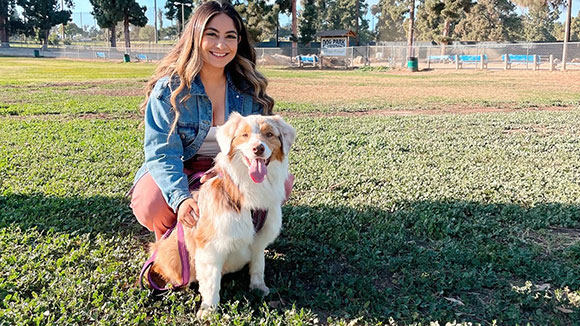 Vianca and her dog enjoying a sunny day at the dog park.
Vianca and her dog enjoying a sunny day at the dog park.
(Image courtesy of Vianca Cortes.)
Health disparities continue to persist across underserved and vulnerable populations and contribute to the decline of patient health. As a result, the need for healthcare providers who actively advocate for health equity in these populations is imperative to eliminating these disparities.
Coastline’s own Vianca Cortes, former Pre-Med Club Vice President, and passionate, aspiring Physician’s Assistant, has witnessed these disparities personally and professionally and is dedicated to being a healthcare provider who provides accessible and equitable healthcare to underserved, marginalized, and vulnerable populations.
After graduating from Cal State Long Beach in 2018, Vianca came to Coastline to complete pre-requisites for PA school. Now, after applying and being accepted to multiple PA programs, she will attend the Utah Physician Assistant Program (UPAP) this summer!
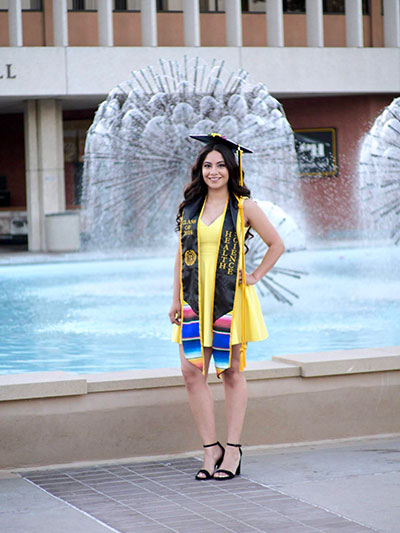
Vianca as a Cal State Long Beach graduate.
(Image courtesy of Vianca Cortes.)
Vianca’s story is a testament to the importance of having healthcare providers who care about their patients and who are actively advocating for equitable and accessible healthcare for the communities in lack of it. In this blog, learn more about her journey to becoming a PA, what she learned being in the Pre-med Club, the PA program application process, and more!
On March 15th, Vianca, along with other Coastline Alumni, will be speaking at Coastline’s Healthcare Careers Virtual Summit on March 15th, where students who are interested in pursuing a healthcare career have the chance to listen to, connect with, and learn from Coastline Alumni and professionals in the healthcare field.
Explore Biological Sciences & Allied Health @ Coastline
Background and journey to Coastline.
I grew up in Downey, CA, and I graduated from CSULB in 2018 with a bachelor's in health science and a minor in human development. Right before I graduated from CSULB, I realized I wanted to pursue the PA profession. I decided to come to Coastline College to finish my pre-requisites for PA school.
My experience at Coastline has been nothing but positive. Throughout my journey, I felt supported by both faculty and students. Professors have truly exceeded my expectations in assisting me to attain my academic goals. I can say without a doubt that enrollment in PA school would not have been possible without the assistance of the personnel at Coastline.
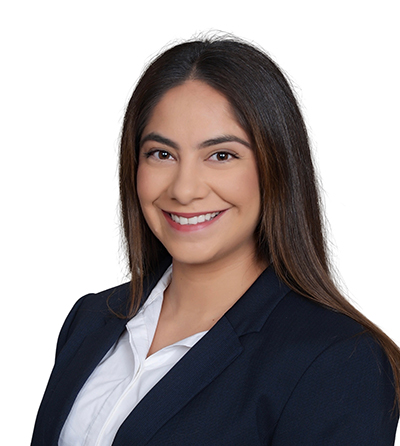
Vianca Cortes.
(Image courtesy of Vianca Cortes.)
What inspired you to become a physician’s assistant?
From a young age, I knew I wanted to pursue a career where I could care for vulnerable populations. The reason I am standing here today and why I want to pursue a career in medicine is because of my family and patient encounters that have and continue to motivate me to become a PA to positively impact marginalized communities. I have witnessed the effects of health disparities on my family, and this was later reinforced while working in DTLA where I saw many patients' health decline, due to a lack of access to care or understanding of disease management.
As a first-generation Mexican American, my passion lies in providing care to individuals who lack access to appropriate care, which is why I want to work in family medicine. Becoming a PA will give me the autonomy to provide high-quality patient-centered care, and the versatility of the PA profession to work in various medical subspecialties will allow me to pursue my interest in primary care and the freedom to try other specialties.
Vianca recently attended the grand opening of Coastline's new Human Anatomy Suite and shares her excitement for the wonderful new opportunity for Coastline students.
Were there any pivotal experiences, resources, or support from the Pre-Med Club, or other opportunities at Coastline that were conducive to your success?
The experience I gained as a pre-med club officer bolstered my confidence during interviews. As a club officer, I gained the ability to speak in public with greater assurance, developed the courage to express my viewpoints, and mastered problem-solving and teamwork skills. The pre-med club members provided constant support, and it was a pleasure to be in the company of individuals who shared the same aspirations and objectives in life.
Even when academics became difficult, being in the company of these students inspired me to persevere. Additionally, the student Career Services supported my application. I had never created a school resume before, so I had no idea where to start. Dr. Paolo Varquez was phenomenal; he assisted me in revising my résumé to appear more professional.
Learn More About Pre-Med Club @ Coastline
How did you feel when you found out you were accepted into multiple Physician assistant programs? How did you determine which program to choose?
As a first-time applicant, I was excited and found it hard to believe that I had been accepted to multiple PA programs. Having heard of and known numerous individuals who were not accepted on their initial attempts, I definitely went into the application cycle with the idea that I might have to reapply. I chose to attend UPAP for several reasons.
First, I admire the program's commitment to diversity, equity, and underserved communities. I strongly believe that by enrolling in UPAP, not only will I be adequately equipped to become an exceptional PA, but it will also mold me into the mindful and culturally sensitive provider that I strive to become. UPAP provides numerous opportunities for students to interact with the underserved. They have student-run clinics and offer an international rotation in a third-world country. The lessons I learn while being exposed to various patient populations will empower me to continue advocating for health equity.
Lastly, one of the things I really appreciate about UPAP is the early clinical experience during the didactic year because it allows me to integrate the knowledge and skills I learn in the classroom and apply them to real patients. This is a great way to reinforce what I am learning and prepare me as I enter my clinical year.
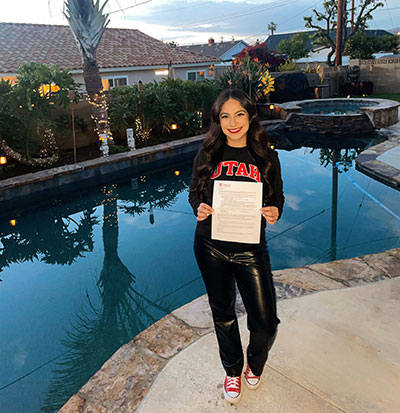
Vianca with her UPAP acceptance letter.
(Image courtesy of Vianca Cortes.)
How did you strengthen your application to make yourself stand out amongst other applicants?
I believe what made me stand out amongst other applicants was my various healthcare experiences. Over the past 6 years, I have worked in an ambulance as an EMT, a medical assistant, and finally, as an ER tech. This also helped me during my interviews because I was able to answer most of the questions with personal stories.
This reinforced the principle of "show, not tell," and I believe it could have assisted the interviewers in remembering me. In addition, I ensured that my application was strengthened by including a compelling personal statement. I spent about three months editing and rewriting my personal statement. I also had a few of the doctors I worked with read it and give me their feedback.
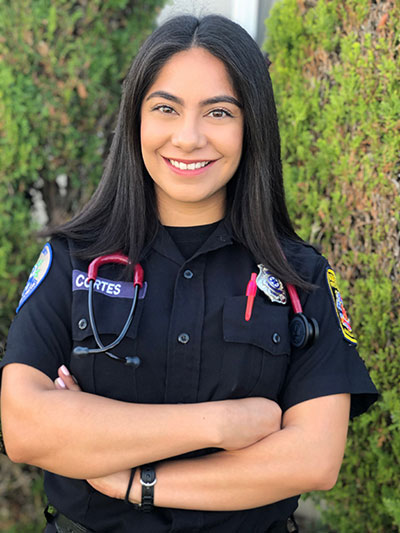
Vianca in her EMT uniform.
(Image courtesy of Vianca Cortes.)
What was the most rewarding and most challenging thing about your journey? How did you stay resilient through your challenges?
Gaining self-awareness and determining the type of provider I aspire to be has been the most gratifying aspect of this overall journey. I feel like I have a purpose in life, and I know the steps I need to take to fulfill my purpose of improving a community's health.
My journey towards PA has had its challenges and has taken longer than expected because personal circumstances prevented me from being a full-time student. As a result, I had to learn how to balance working over 40 hours and going to school. These challenges ultimately helped me improve my time management and academics, preparing me for PA school and beyond.
Through my difficulties, I maintained resiliency by maintaining a positive outlook and constantly reminding myself to concentrate on the aspects within my control as opposed to those beyond my control. I would constantly remind myself that even when I was struggling in academics, at the end of the day, I would acquire more knowledge than when I started. Additionally, I gained the ability to be flexible and adaptable whenever a new obstacle presented itself. I acquired the ability to welcome change by approaching novel circumstances with eagerness and readiness to acquire knowledge.
Lastly, I established friendships with my professors and a supportive group of peers, including members of the Pre-Med Club. All of them provided me with guidance, encouragement, and unique viewpoints regarding the best way to approach a given dilemma.
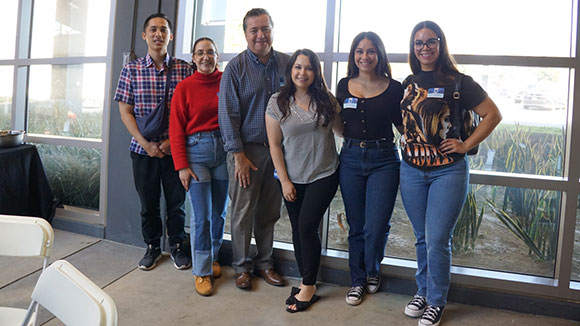
Vianca and the Coastline College Pre-Med Club at Coastline's Newport Beach Campus.
(Image courtesy of Vianca Cortes.)
What advice would you give to students pursuing a healthcare career?
I recommend that students aspiring to pursue a career in healthcare acquire early exposure to the field by obtaining an entry-level position, such as that of an EMT, CNA, phlebotomist, or MA. My initial healthcare encounters facilitated my adjustment to diverse healthcare environments and infused me with the confidence to talk and help treat patients.
I have encountered numerous healthcare professionals who had a lack of early healthcare exposure prior to their professions and later realized they had made a mistake and did not want to work in healthcare. You will also acquire skills that will be beneficial to your future career, but more importantly, it will assist you in determining whether or not healthcare is the correct path to take.